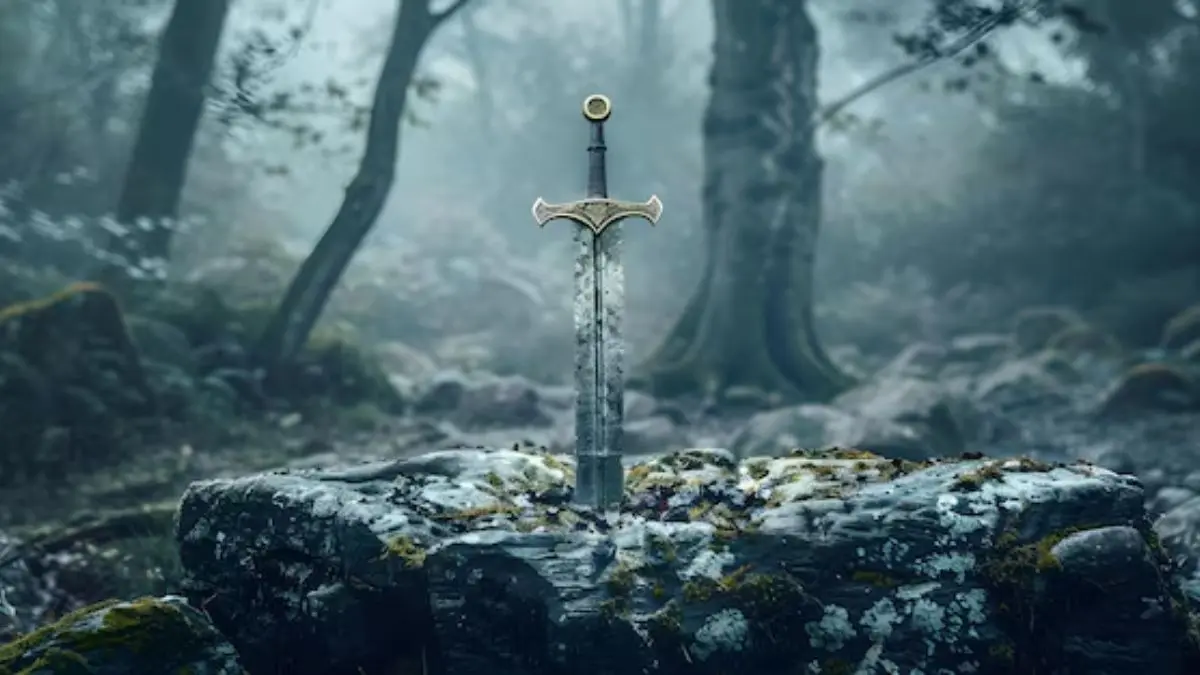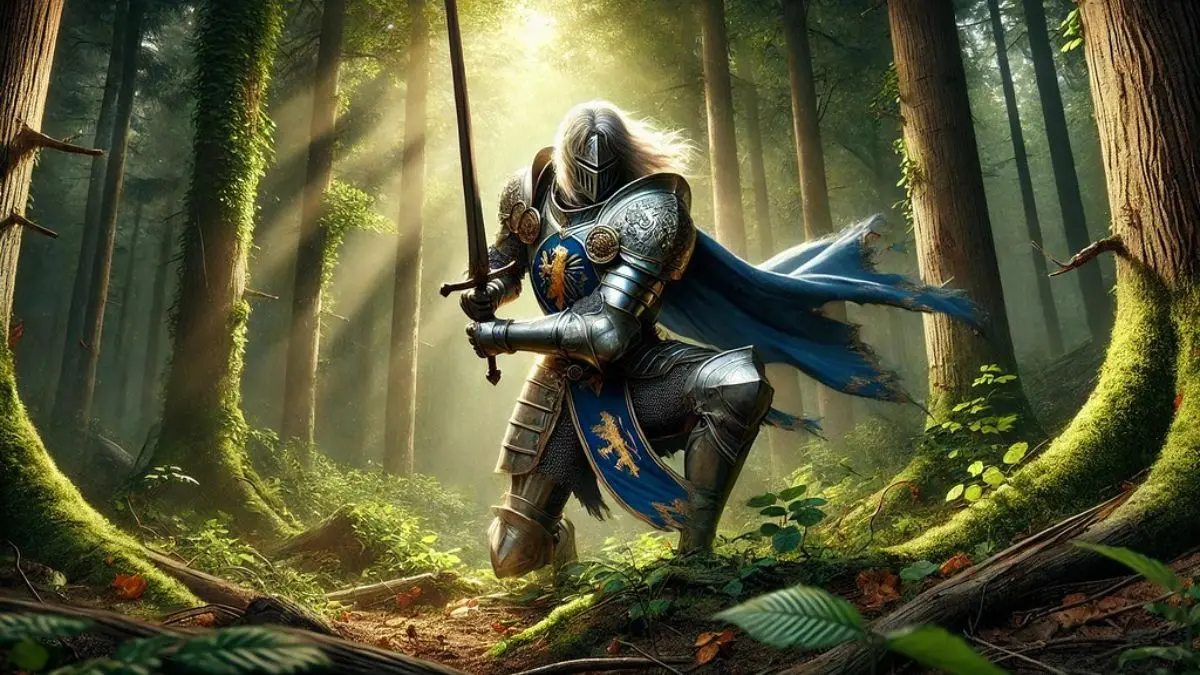Excalibur, the legendary sword of King Arthur, has captured the imagination of readers, historians, and storytellers for centuries. Often depicted as the ultimate symbol of divine kingship, heroism, and power, Excalibur’s mystique extends far beyond the pages of Arthurian legend. In this blog, we’ll explore the origins, symbolism, and cultural significance of Excalibur, unraveling the mystery behind one of history’s most iconic weapons.
The Origins: Sword in the Stone or Lady of the Lake?
Excalibur’s origins vary across different versions of Arthurian legend. The most famous accounts credit the sword as either being pulled from a stone or bestowed upon King Arthur by the mystical Lady of the Lake.
- The Sword in the Stone
One version of the legend, popularized by Sir Thomas Malory’s Le Morte d’Arthur, describes a magical sword embedded in a stone. According to this tale, only the rightful king of Britain could pull the sword from its resting place. This feat marked Arthur as the chosen one to rule, setting the stage for his rise to greatness. - The Lady of the Lake
Another version tells of the Lady of the Lake, a mysterious figure who emerges from the waters to present Excalibur to Arthur. This version emphasizes the sword’s divine origins and its connection to otherworldly forces, reinforcing Arthur’s role as a ruler ordained by fate.
Interestingly, some interpretations merge these Stories, suggesting that Excalibur and the sword in the stone are separate weapons, each playing a pivotal role in Arthur’s journey.
The Name and Meaning of Excalibur
The name “Excalibur” has its roots in ancient languages. Derived from the Old French Excalibur and the Latin Caliburnus, the name is thought to trace back to the Welsh phrase Caledfwlch, which translates to “hard-breach” or “cleaving steel.” This etymology reflects the sword’s reputation as an invincible weapon capable of cutting through any material.
Beyond its literal meaning, Excalibur symbolizes authority, justice, and the bond between a ruler and their realm. It serves as a testament to Arthur’s legitimacy as king and his commitment to uphold the values of chivalry and fairness.

Magical Properties
Excalibur is no ordinary sword—it is imbued with magical powers that set it apart from any earthly weapon. Depending on the version of the legend, the sword possesses a range of extraordinary attributes:
- Unbreakable Blade
Excalibur is often described as indestructible, making it a weapon of unparalleled reliability in battle. - Blinding Light
Some accounts depict Excalibur as emitting a radiant light so bright that it could blind Arthur’s enemies, giving him a supernatural edge in combat. - The Scabbard’s Protection
While the sword itself is revered, its scabbard holds an equally significant power: it prevents the wielder from bleeding or sustaining mortal wounds. In many retellings, the scabbard’s loss proves disastrous, signaling Arthur’s vulnerability.
These magical properties elevate Excalibur from a mere weapon to a symbol of divine intervention and destiny.
Excalibur in the Context of Arthurian Mythology
Excalibur is inseparable from King Arthur’s narrative, appearing at pivotal moments throughout his life. Here are a few notable examples of its role in the legend:
- Arthur’s Coronation
Excalibur serves as a tangible sign of Arthur’s right to rule, whether through the act of pulling the sword from the stone or receiving it from the Lady of the Lake. This moment solidifies his destiny as the unifier of Britain. - Battles and Triumphs
With Excalibur in hand, Arthur leads his knights to numerous victories, including significant battles such as Mount Badon. The sword’s presence reinforces Arthur’s image as an unbeatable warrior and protector of his kingdom. - Arthur’s Final Battle
In the climactic Battle of Camlann, Excalibur plays a crucial role. Following Arthur’s fatal wounding, he commands that the sword be returned to the Lady of the Lake, completing its mystical cycle. This act symbolizes the end of his reign and the enduring legacy of the weapon.
Symbolism: More Than Just a Sword
Excalibur is much more than a weapon; it embodies multiple layers of meaning:
- Kingship and Authority
The sword represents the divine right to rule, with its magical origins emphasizing that Arthur’s authority is sanctioned by higher powers. - Chivalry and Justice
Excalibur is often associated with the ideals of the Round Table, including bravery, fairness, and the protection of the weak. - Mortality and Legacy
The sword’s return to the Lady of the Lake after Arthur’s death underscores the transient nature of human life and the enduring power of myth. Excalibur becomes a timeless artifact, ensuring that Arthur’s story continues to inspire future generations.
Excalibur in Popular Culture
The legend of Excalibur has transcended medieval literature to influence modern storytelling. From literature and films to video games and television, the sword remains a potent symbol of heroism and magic.
- Films and Television
Movies like Excalibur (1981) and series such as Merlin and Camelot have brought the story of King Arthur and his legendary sword to new audiences, often reimagining the legend with modern twists. - Books and Novels
Writers such as T.H. White (The Once and Future King) and Marion Zimmer Bradley (The Mists of Avalon) have explored Excalibur’s role from unique perspectives, expanding the mythos in creative ways. - Games and Fantasy Worlds
Video games like Final Fantasy and The Legend of Zelda borrow heavily from Excalibur’s mythos, introducing magical swords as central elements in their narratives.

The Enduring Legacy
Excalibur continues to resonate with audiences because it represents timeless values: courage, leadership, and the quest for a greater good. Whether as a magical artifact or a symbol of idealized kingship, the sword inspires us to aspire to greatness and seek justice in our own lives.
In the words of T.H. White, “The destiny of man is to unite, not to divide.” Excalibur and the legend of King Arthur remind us of this noble goal, urging us to wield the power of our convictions wisely and justly.
Also Read: Vedic Science and Its Relevance in Today’s World









